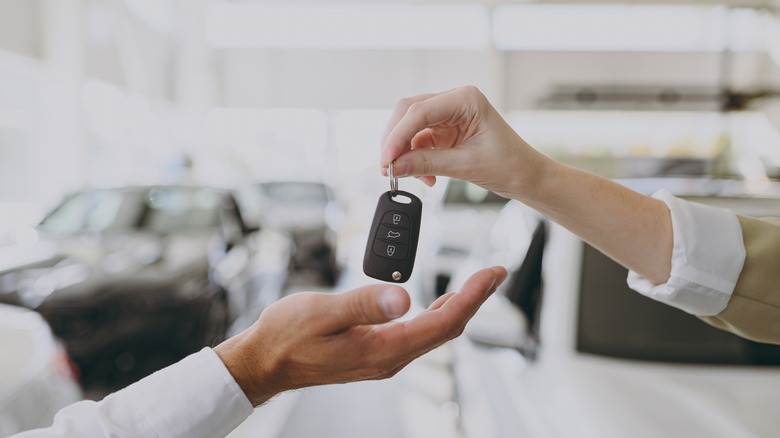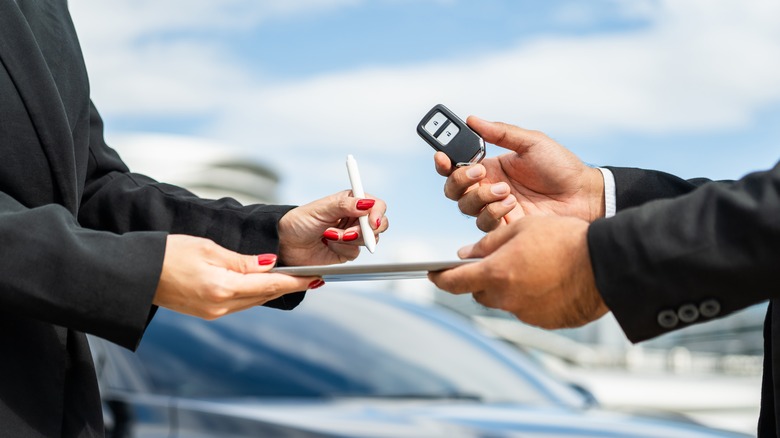What Happens If The Former Owner Of A Used Car Doesn't Pay The Sales Tax?
Purchasing a used vehicle can be a tricky adventure, as buyers are expected to properly assess the physical well-being of the exterior and interior of the car. But as the potential new buyer of a pre-owned car, you must also pay attention to the sales tax. In general, most states levy a sales tax on a transaction involving used vehicles and trade-ins. Depending on the state and the car's value, that percentage could be different — even zero. Moreover, in a few states, you can apply for exemptions, as well. But if you live in a state where a sales tax is applicable, you should be careful before the transaction of a pre-owned vehicle is finalized.
If the ownership of a used car is transferred, the buyer is accountable for paying any pending sales tax on the vehicle, and not doing so is a punishable offense that falls under the aegis of local tax evasion laws, starting with penalties. In the state of Alabama, for example, the car's new owner is held liable if there are any unpaid taxes, even if they were accrued by the previous owner. "As a general rule, officers, members, owners, and anyone with any responsibility for financial decisions could be held personally liable for unpaid sales tax," says RSM, an accounting firm that offers tax and auditing services. The company's US arm further adds that different rules apply when it comes to personal liabilities and how the associated taxes must be recovered.
Sales tax dues won't go away
Before purchasing a used vehicle, potential buyers should pay close attention to the tax and dues paperwork tied to a car. One car salesperson recently found this out the hard way. In a TikTok video that is making rounds online, a car salesperson (with the handle @rideorbuy3) detailed an incident where a South Dakota resident sold them a car, and when it was taken to the DMV for registration in Missouri, they were told that the car owed a pending sales tax worth $3,300. The miffed salesperson covered pending taxes to ensure that their customer didn't have to pay more than the price that was originally agreed upon for the car's sale and to avoid any legal troubles.
@rideorbuy3
If you're not buying a pre-owned car from a dealership and holding the talks directly with a seller, you must be mindful of any outstanding dues. According to the law, as the current owner, you will have to bear the burden and the legal repercussions. If there are any pending taxes, it's best to pay them in the state where the seller registered their car. That way, when the new owner takes it to the DMV in their state, they only have to pay the registration fee.
How to stay vigilant about dues on used vehicles?
Now, it's not just the sales tax that can make the situation tricky for the new buyer of a pre-owned car, but also the penalties and any other charges slapped on a vehicle for violation of the local driving laws. These can accumulate even if the car is not in active use on roads and highways. "When an Alabama resident buys a vehicle with an outstanding ad valorem tax lien, the buyer must: Pay all ad valorem tax that has accrued on the purchased vehicle since it was last registered and any applicable interest and penalties on taxes that are delinquent," says the revenue department of Alabama.
As a general rule of thumb, if you are gifting or buying a used car, make sure that you get a clearance slip or declaration (or whatever documents are applicable in that state), certifying that there are no outstanding taxes and dues left unpaid for the car. This sales tax situation is handled by the local revenue department, while the situation with penalties and other dues is usually handled by the DMV.
The best way forward is to get a vehicle history report from sources like CARFAX and AutoCheck. You can also manually check the records of parking violations, lien status on a car by visiting the local DMV website, such as in New York. Alternatively, one can also contact the state DMV to vet the status of any unpaid dues on a used car using the VIN number. Unfortunately, there is no nationwide database that offers a 360-degree view of the status of penalties and taxes accumulated by a car.


